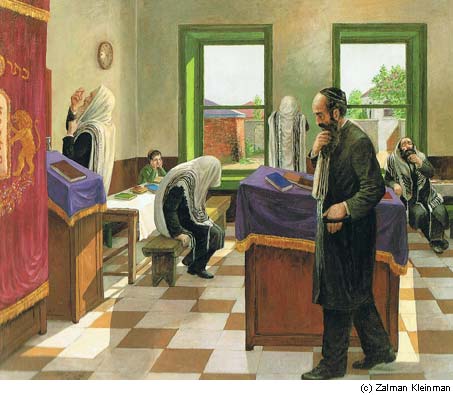Rabbi Shneur Zalman of Liadi The Alter Rebbe Parshat Ki Teze 5565-1805 (2) second version
Indented text by the translator
Undue Punishment
So a truly remarkable question is posed. Why are reward and punishment applied to man in accordance with his good and evil deeds? Ultimately, man’s acts are not dependent on him alone. God’s assistance is the causative factor: occasionally He helps, other times He doesn’t. So how can man be held accountable?
Our parable provides the answer. God’s intent isn’t the actual battle at all, for even our victory is irrelevant, as Job commented, “If you were righteous, what have you given Him?” Rather, God’s goal is the supernal laughter and Delight that life’s contests produce. Animal fights aren’t staged, the parable tells, just to watch beasts battle. They are orchestrated to bring laughter and delight to the king.
A Wonderful World
What is supernal Delight? It is the revelation of the world of Delight. Again a parable is helpful. A king retires to his inner sanctuary, hidden from other people. No one can communicate with him in any way. Wild beasts are brought before him, and they fight to the death.
The king rejoices at the spectacle. He laughs in delight. His face becomes flushed from the intense pleasure. At that time, his faculty of delight, formerly concealed, bursts into the open. Immediately, all of his harshness and severities are sweetened. Now he is inclined to speak with everyone, regardless of their status.
But laughter is more exalted than delight. We observe that laughter sweetens severities to a greater extent than do revelations of delight elicited by the joy brought about by some particular matter. This is because laughter comes from the soul’s core of Delight.
Singular Spark
Chassidus distinguishes between spirituality and essence. The 10 attributes or sefirot are considered spirituality. Yet God Himself possesses essential attributes, prior to their emanation.
Souls are created from a divine template. They likewise manifest a state of both spirituality and essence. The soul’s absolute source is within God’s innermost essence. Eitz Chaim writes of this “An infinitesimal spark of God descends from the Creator to be enclothed within an extremely fine created soul which is called the yehidah.”
The yehidah—regarded as the uppermost aspect of the soul —is written in the feminine. That indicates that it is actually a receptacle for the soul’s ultimate source: God’s truest Essence, called Yahid (singularity), which is written in the masculine. This level of Yahid corresponds to the innermost aspect of Atik, soon to be explained.
Light of Joy
Delight resides within the inner aspect of Crown (keter)—the uppermost sefira. Yet there are successive manifestations of keter—each one hovering over the world below it. In a mirror image, souls have varied levels of delight. Joy obtained from a good meal, for example, is revealed from the particular level of Delight at which food consumption is relevant. A specific pleasure evokes a correspondingly specific delight.
Laughter, in contrast, reaches into the absolute essence of the soul. It exposes the soul-essence’s attribute of Delight.
References
Private Pleasure
This revelation is termed, the Ancient One (Atik).
Idra Rabba, page 129, side b;
Pri Eitz Chaim, portal 7, chapter 15.
“the rejoicing of the King in Himself”
The Book of Proverbs, chapter 8, verse 30.
This light and joy then illuminate all the worlds.
Remez on The First Book of the Zohar, page 135, side a.
Atik is termed “the world of Delight”
Ibid., on The Second Book of the Zohar, page 98, side a.
It possesses an inner and an outer element.
Eitz Chaim, portal 23, chapter 5.
Its external aspect connects to the next realm down—Will.
Ibid., portal 13, chapter 3; ibid., portal 23, chapter 5.
Within Atik’s externality are found the seven emotive and action attributes
Pelach HaRimmon, portal 8, chapter 6;
Eitz Chaim, portal 13, chapters 3 and 7.
Crown , Wisdom (chochmah) and Understanding (binah), make up the
Idra Rabba, page 129, side b.
this most essential of realms is termed “the King rejoicing in Himself”
Emek HaMelech, portal Aba V’Ima, chapter 12, page 71, column d.
Last Laugh
“she laughs at the last day”
The Book of Proverbs, chapter 31, verse 25;
The First Book of the Zohar, chapter 172, side a.
“the leviathan You fashioned to laugh with”
The Book of Psalms, chapter 104, verse 26.
“Wild animals and the leviathan will participate in the contest of …”
Vayikra Rabbah, chapter 13, section 3.
End Game
Seven Thousandth Year
The Babylonian Talmud, Tractate Sanhedrin, page 97, side a.
“The world was created for 6,000 years,” according to the Talmud.
Ibid., Tractate Sanhedrin, page 31, side a.
Messianic times, the Resurrection of the Dead, and the eternal Seven
Rabbeinu Bachayei, The Book of Genesis, chapter 2, verse 2;
Shelah, (hagah) section Toldos Adam, chapter Beis David, paragraph 43.
Carnivores’ Carnival
“He is the beginning of God’s ways, let Him who fashioned him bring …”
The Book of Job, chapter 40, verse 19.







